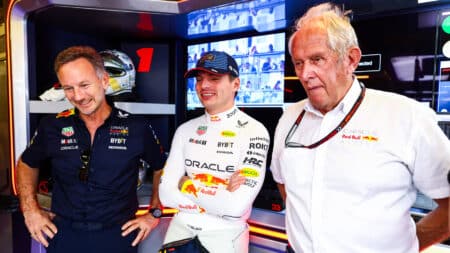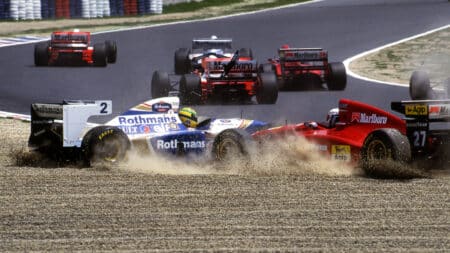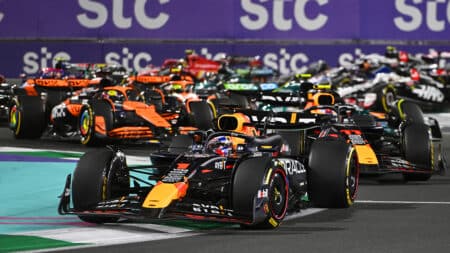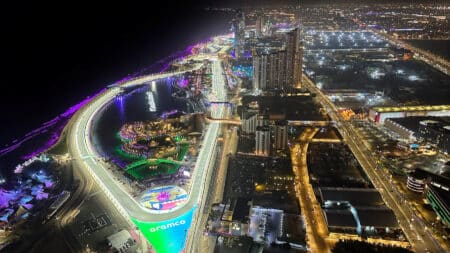
How real are Red Bull's concerns that Verstappen could leave early?
Helmut Marko caused a stir after the Bahrain GP with his worries that Max Verstappen could leave Red Bull early. But how real are those fears?
This week in motor sport, from the database
July 20 // July 21 // July 22 // July 23 // July 24 // July 25 // July 26 //
1943 Chris Amon (above) was born 75 years ago on New Zealand’s North Island. Widely recognised as the greatest driver never to win a Grand Prix, Amon led seven World Championship events without it ever being his day. He won the 1966 Le Mans 24 Hours with countryman Bruce McLaren as Ford finally beat Ferrari. That success established Amon’s reputation and he joined the Scuderia in 1967 and shared fourth in that year’s World Championship. He won the 1970 International Trophy for March and following year’s non-championship Argentine GP for Matra after taking the 1969 Tasman championship. Desperately unlucky not to win the 1972 French GP, he continued to race in Formula 1 until 1976. Amon died in 2016.
1957 The 1957 British Grand Prix at Aintree provided a landmark victory for Vanwall – the first World Championship race win for a British car. The Vanwalls of Stirling Moss and Tony Brooks shared the front row with Jean Behra’s Maserati and it was Moss who led from the start, pulling 10 seconds clear of Behra before his Vanwall developed a misfire. Brooks, who was still recovering from the battering he had received when he crashed at Le Mans, handed his car to Moss on lap 26. Moss rejoined in ninth position and lapped at record pace as he climbed back through the field. Moss was up to fourth on lap 69 when the complexion of the race changed. Behra, who now led by 22 seconds, retired and second-placed Mike Hawthorn punctured a tyre on debris from the Maserati. Moss passed team-mate Stuart Lewis-Evans at the same moment to assume a lead he would not surrender.
1985 In one of the most famous qualifying laps in modern Formula 1 history, Keke Rosberg (Williams-Honda) became the first driver to lap Silverstone at over 160mph. “Spectacular is a simple word to use, and if you weren’t there to see it, it is a great pity” Motor Sport reported. Others came close on that blustery day, but Rosberg finally stopped the clock at 1min 5.591sec to average 160.925mph for his pole position lap. He retired from the following day’s race and it was Alain Prost’s McLaren-TAG that won by a lap.
2003 It is 15 years since the 2003 British Grand Prix was thrown into confusion by the one-man track invasion of Neil Horan. “The lunatic in the skirts,” as Flavio Briatore described the kilted former priest, ran onto the Hangar Straight on lap 13 with drivers forced to take avoiding action as disaster seemed inevitable. The resulting safety car caused a flurry of pitstops that mixed up the order. Cristiano da Matta led for Toyota but it was pole winner Rubens Barrichello who emerged as the class of the field, passing his way to an impressive victory for Ferrari.
2002 Ferrari was utterly dominant in 2002 and Michael Schumacher clinched his fifth World Championship on this day at the French Grand Prix. That was the earliest the title had been decided in history as the German matched Juan Manuel Fangio’s five World Championships to date. Kimi Räikkönen was on course to score his maiden GP victory until his McLaren ran wide on oil with three laps to go. Schumacher took advantage with Räikkönen and team-mate David Coulthard completing the podium finishers.
1980 New Zealander Scott Dixon was born in Brisbane, Australia in 1980. He originally wanted to emulate his countrymen Bruce McLaren and Denny Hulme in Europe but it was in North America that he established himself as a star. Indy Lights champion in 2000, Dixon graduated to Champ Cars in 2001 before switching to the rival Indy Racing League with Chip Ganassi Racing. He has remained with the team ever since and has won the IndyCar title on four occasions and the Indianapolis 500 in 2008.
1984 Niki Lauda (above) won the British Grand Prix at Brands Hatch as McLaren-TAG began an unbeaten second half to 1984. Nelson Piquet qualified on pole and led the opening 11 laps before Jonathan Palmer’s crash at Clearways forced the race to be stopped, just as Alain Prost passed Piquet for the lead. Lauda eased to victory in the restarted race after Prost succumbed to gearbox failure and Piquet lost turbo boost. Derek Warwick finished second for Renault and Ayrton Senna’s Toleman snatched third a couple of laps from the end.
2007 The son of late Formula 1 and sports car driver Manfred, Markus Winkelhock became the eighth driver in history to lead on his Grand Prix debut, on this day in 2007. The European GP began just as a heavy downpour doused the Nürburgring. Winkelhock, who qualified 22nd after replacing Christijan Albers at Spyker, changed to intermediate tyres at the end of the parade lap and so started from the pitlane. By the end of lap two, he was in the lead as more experienced rivals were caught out by the torrential rain that followed. The safety car was deployed and Winkelhock led his only GP for six laps before normal service was resumed. His engine failed after 13 laps and Fernando Alonso went on to win for McLaren.
1935 American racing driver and innovative founder of Chaparral Cars, Jim Hall was born on this day in 1935. He began racing in 1953 and impressed on his Formula 1 debut seven years later by finishing seventh in the United States Grand Prix. Fourth in the non-championship 1962 Mexican GP, he raced for BRP in the 1963 World Championship and twice scored points when sixth at Silverstone and fifth in Germany. He had formed Chaparral by now and won the 1964 United States Road Racing Championship and 1965 Sebring 12 Hours for the marque. Hall continued to enjoy success as a team owner into the 1990s.
1939 Out of the nine Mercedes and Auto Unions that started the 1939 German Grand Prix, only one car from each team finished as mechanical failure and accidents decimated the pre-race favourites. Mercedes veteran Rudolf Caracciola drove a conservative race in the drizzle to win his home GP for the sixth and final time with Hermann Müller second for Auto Union. Paul Pietsch’s 3-litre Maserati led briefly and finished third.
2002 British American Racing team principal David Richards announced that Jenson Button had signed a long-term deal to join the team from 2003. Having struggled during two seasons with Benetton and Renault, Button eventually established himself with the Brackley-based concern. He won his first Grand Prix for what was now called Honda in Hungary in 2006 and was a cornerstone of the team when the Japanese manufacturer withdrew at the end of 2008. The team was saved that winter and rebranded Brawn Grand Prix with Mercedes-Benz now supplying engines. Button then won six of the opening seven races as he clinched an unlikely world title in 2009.
1938 It is 80 years since Richard Seaman (above) won the German Grand Prix for Mercedes-Benz. Silver W154s filled the first four grid positions with Manfred von Brauchitsch having qualified on pole. The German was on course to victory when his car caught fire during a routine refueling stop at the end of lap 15. Team manager Alfred Neubauer waved second-placed Seaman to rejoin the track and take the lead. Seaman completed the remaining seven laps to become the first Englishman to win a continental GP since Henry Segrave.
1982 René Arnoux disobeyed team orders to win the 1982 French Grand Prix on a day when French drivers filled the top four places. Arnoux led a Renault 1-2 in qualifying but was passed by the Brabham-BMWs during the early stages at Paul Ricard. Both Riccardo Patrese and Nelson Piquet suffered engine failures so Arnoux led team-mate Alain Prost and the Ferraris of Didier Pironi and Patrick Tambay to the finish.
1985 Nelson Angelo Piquet was born in Heidelberg on this day in 1985. 2004 British Formula 3 Champion and GP2 runner-up in 2006, the son of triple world champion Nelson Piquet graduated to Formula 1 with Renault in 2008. That season included a surprise second-place finish at Hockenheim, just miles from his birthplace, and an infamous crash in Singapore. Dropped mid-way through the following season, Piquet has since won the inaugural Formula E title and continues to race in that electric series and the World Endurance Championship.
1896 One of the most flamboyant racers of his generation, Sir Henry “Tim” Birkin was born in Nottingham in 1896. Having served with the Royal Flying Corps during World War I, Birkin raced at Brooklands in 1921 but marriage and business pressures soon halted that career. He returned in 1928 with Bentley and finished fifth at Le Mans and in the Tourist Trophy. He won the following year’s Le Mans 24 Hours with Woolf Barnato and scored a notable second-place finish in the 1930 French Grand Prix, his Bentley towering over the nimble Bugattis. Bentley withdrew at the end of the season and Birkin won Le Mans for a second time in 1931 when driving Earl Howe’s Alfa Romeo. His Maserati 8C was third in the 1933 Tripoli GP but Birkin burnt his arm against the hot exhaust during the race. He died a month later after the wound became infected and Birkin developed septicaemia and blood poisoning.
1921 American star Jimmy Murphy (above) scored a famous victory in the French Grand Prix on this day in 1921. “Gentle Jimmy” led a four-car Duesenberg team to the most important race of the year on a circuit laid out on roads to the south of Le Mans. Only discharged from hospital two hours before the race following an accident in practice, Murphy dominated for much of the event and beat fellow American Ralph de Palma’s Ballot by 15 minutes. The victory banquet is reputed to have started with a toast to the first Frenchman home (third-placed Jules Goux) and the Americans promptly walked out to eat ham and eggs in a nearby café. Murphy won the Indianapolis 500 and national championship in 1922. He was killed at Syracuse in September 1924 having already accumulated enough points to be posthumously awarded a second Indycar title.
1987 Nelson Piquet won a race of attrition at Hockenheim on this day in 1987. The Williams of team-mate Nigel Mansell and McLaren’s Alain Prost both led but retired and the German Grand Prix ended with just seven cars circulating at the finish. Stefan Johansson three-wheeled across the line to finish second after puncturing a front tyre on the last lap. Ayrton Senna was third despite his active suspension failing in the closing stages with the Lotus slowed by 15 seconds a lap. Normally aspirated runners filled the next three positions with Martin Brundle too far behind following a couple of lengthy pitstops to be classified.

Helmut Marko caused a stir after the Bahrain GP with his worries that Max Verstappen could leave Red Bull early. But how real are those fears?

Ayrton Senna’s tragic final races in 1994, marked by controversy over illegal traction control and his relentless pursuit of excellence in a challenging car, remain a poignant chapter in F1 history, as Matt Bishop recalls

Full F1 schedule for the year, including the next F1 race of 2025: the Saudi Arabian Grand Prix, the whole calendar and circuit guides for the 24-race Formula 1 season

Round five of the 2025 Formula 1 season wraps up the first triple-header of the year in Saudi Arabia. There are the dates and start time for the Jeddah event, including all sessions